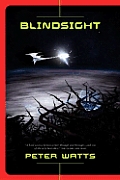In Starfish, Watts took an idiosyncratic and dysfunctional set of people and put them on the bottom of the ocean, under emotional pressure and in a very alien environment, and showed how they changed and adapted. In Blindsight he does something similar, except this time the band of heroes is even less normal and the environment is even more hostile. Watts isn't the writer to read for average people in expected or rational places; in creepy settings with characters on the margins of human behavior, he thrives.
In Blindsight, the hostile setting is a previously undiscovered giant planet in the far outer reaches of the solar system and in the alien starship that is orbiting it. Earth was shocked by the sudden appearance of thousands of meteors leaving streaks across every quadrant of the sky, meteors whose dying signals revealed them to be probes of some kind. Further investigation found this planet, and the manned mission there uncovered a ship thriving in magnetic fields of insane strength and an environment bordering on the horrific.
The first-person viewpoint character of Blindsight has had a radical hemispherectomy (removal of half his brain to control seizures). He's emotionally distant, analytical, serving as a synthesist who understands and manipulates patterns without always understanding them. He thinks of himself as mimicking human behavior rather than feeling it. The crew that he's watching consists of a translator and language specialist with artificially induced multiple personalities, a biologist so integrated into external computer interfaces that he's no longer entirely human, a soldier with instant mental control of an automated army of soldiers, and a captain who is a vampire. The world they're entering creates hallucinations and even stranger psychological maladies by disrupting every part of the brain. And the alien creatures they encounter speak apparently perfect English, but are maddeningly indirect about their nature or intentions. This book is disturbing on multiple levels and occasionally borders on horror, but the built-in distance of the narrator and the intermixing of his life story and odd perspective gives the reader enough breathing room to not overwhelm.
Watts's vampires are a wonderful touch and a good example of the way that he weaves weird biology and speculation into the story. Vampires in this world are a different species that used to prey on humans, ones that developed an ability to lie dormant for years so as to not exhaust their prey supply and who possess a far-superior conceptual and visual acuity. However, that visual acuity came with an evolutionary price: vampires suffer from a perceptual malady known as the Crucifix Glitch that causes intersecting straight lines (very rare in nature) to send them into seizures. As soon as humans evolved enough to start building, their propensity for straight lines and accidental crosses drove vampires into extinction until they were recloned from recovered DNA millennia later.
Blindsight is full of bits like that where Watts uses analogy to other species and accidents of biology to create intriguing ideas or reinterpret human perceptions. As with his previous series, he adds an appendix that goes over the scientific justification for things he threw into the book. Watts used to be a marine biologist and puts the knowledge to good use; I think his aliens gain an extra twist of weirdness from being inspired by strange aquatic life rather than less experienced imagination.
I'm talking about secondary features rather than the main thrust of this book intentionally. Blindsight is a novel built around a very specific speculation about life and intelligence (and, indirectly, about the Fermi Paradox), but reaching that speculation is the central mystery of the novel. I was already spoiled on the core discovery of the characters before I read the book, and I think it suffered because of that. For the best reading experience, try to go in knowing as little about the narrative message as you can. Blindsight is, under the weird psychology and borderline horror, a classic SF Big Dumb Object story about exploring and understanding the Other, and knowing too much about what the Other is and where it comes from in advance spoils the fun.
I've heard some people complain about the characters in Blindsight. They're certainly prickly and not particularly likeable as people, but I love the way Watts handles interpersonal conflict between misfits. The woman with multiple personalities was my favorite (I have no idea how well her behavior fits with someonw with real MPD, but Watts has a built-in out for any inaccuracies). Similarly, the final revelation and ending of this book will definitely not be to everyone's taste. I disagree with Watts's thesis and conclusions, but it's an interesting argument and one that I would have to work at to refute.
Blindsight was nominated for the 2006 Hugo and deserves the nomination. This is solid speculative fiction with high stakes, an unflinching look at possibly very different forms of life, and a thought-provoking contribution to an ongoing discussion in SF about the nature of intelligent life. I'm not sure I'd give it a Hugo; the ending is rough from a pure entertainment perspective and I didn't buy what happens to Siri in the final quarter of the story. But it's definitely worth reading.
Reviewed: 2007-04-09
